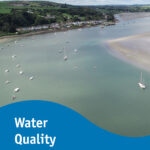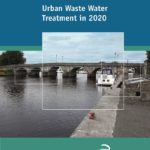June 13, 2023: The Environmental Protection Agency (EPA) has published…
Domestic Waste Water Treatment Systems Inspections in 2022: fixing faulty septic tanks is taking too long
28th June 2023: Domestic waste water treatment systems (DWWTS), mostly septic tanks, are used by householders to treat sewage. There are nearly half a million systems in Ireland. The Environmental Protection Agency (EPA) today released the report on Domestic Waste Water Treatment Systems Inspections in 2022.
The EPA examined the 1,143 inspections of domestic waste water treatment systems completed by local authorities in 2022. Forty-nine per cent (560) of the treatment systems failed inspection because they were not built or maintained properly. Twenty per cent (230) of treatment systems inspected were considered a risk to human health or the environment, because faulty systems can contaminate household drinking water wells and pollute rivers.
“Faulty septic tanks are a risk to human health and the environment. If not built and operated properly, they can pollute watercourses and contaminate household drinking water wells with harmful bacteria and viruses. Where septic tanks are not functioning properly, it is critical that householders fix the problems to protect their family’s health, and the environment.”
Dr. Tom Ryan, Director of the EPA’s Office of Environmental Enforcement
Where septic tanks fail inspection, local authorities issue advisory notices to householders setting out what is required to fix the problem. The report found that there were 550 cases where issues notified to householders over two years previously had still not been addressed. The septic tank grant scheme, offers grants up to €5,000 to assist in addressing malfunctioning systems. Over 200 grants, totaling nearly €1 million were awarded in 2022.
“It is unacceptable that failed septic tanks have not been fixed more than two years after inspection. Half of these involve sewage surfacing in gardens and discharging to ditches and streams, which are health risks that cannot be allowed to continue. Greater enforcement is needed by local authorities, particularly in Roscommon, Waterford, Leitrim and Tipperary, to ensure failed systems are fixed to protect human health and the environment.”
Noel Byrne, EPA Programme Manager
The National Inspection Plan for Domestic Waste Water Treatment Systems 2022 – 2026 was published in 2021. The plan increases inspections from 1,000 to 1,200 from 2023 onwards. There was a shortfall in inspections by five local authorities in 2022 and these need to be completed in 2023. Inspections are focused near rivers where there is greater risk to water quality, and areas with shallow soils where there is greater risk to household wells.
Learn more:
The report, Domestic Waste Water Treatment System Inspections 2022, is available on the EPA’s website.
Have you completed a septic tank system check?
This leaflet tells you how to:
- Check your septic tank works
- Maintain it properly
- Protect your health and local environment
Maintain your wastewater system and you will help to protect your health and local environment.
“A well maintained system in the right site with the right soil conditions will protect your health, your local environment and your pocket.”







